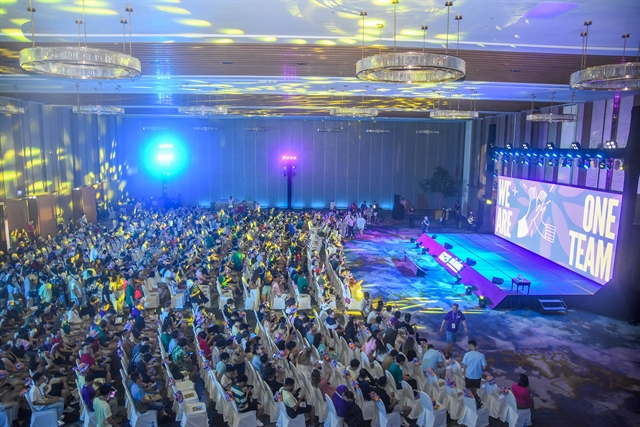

Last week, Việt Nam News asked its readers for their thoughts on social networking sites and their impact on users, and whether people depend too much on networks like Facebook, seeking attention from people on their friend lists. Here are some of their comments:
Last week, Việt Nam News asked its readers for their thoughts on social networking sites and their impact on users, and whether people depend too much on networks like Facebook, seeking attention from people on their friend lists. Here are some of their comments:
Brittany Nicole, English
Some researchers have done studies about people’s lives and Facebook, and they said if you stay away from Facebook, you’ll be happier.
This can be true for some people. They are those who let Facebook distort their perception of reality and of what other people’s lives really look like. These people often have comparisons between their lives and everyone else’s, and since most people only post positive things on Facebook, that gives them a very biased perception of reality.
But if they can stay “awake” – if they can understand that the great news we see on Facebook only represents the top 10 per cent of things that happen to other people, and that it shouldn’t be used to evaluate our own lives – they’ll find more benefits from social networks.
Linh Anh, Vietnamese, Hà Nội
I’ve got my own Facebook account, and have logged in quite regularly, but honestly, I’ve never ever believed in the fabulous and awesome lives of Facebookers – or, in other words, Fakebookers. Everyone on Facebook seems like they’re having a great time: fun adventures, deep romances, fancy restaurants, amazing jobs and hundreds of beautiful moments that make others green with envy.
We seldom see miserable moments shared on social websites. The fact is that nobody is really as happy as their Facebook wall claims. Most tend to be selective about what they share with the world. It’s their life story, and they can do whatever they want with it. Some, ridiculously, even create a fake life on Facebook. They are the ones whose virtual life is perfect, but their real one is really in ruins.
My friend is an example. Her posts are full of status, updates and photos of her romantic relationship with her husband. Everybody leaves their ‘likes’ and comments. All feel envious of her married life. But the truth is that her charmed life is not reality. Her husband seems to be too busy to leave any ‘like’ or comment on his beloved’s posts. He’s busy living with another woman in another province, which is about 200km away from her house. That’s it. I don’t know whether she’s trying to save her marriage, but everything is totally a lie.
So next time, if you feel pangs of envy when reading a Facebook friend’s post about their fabulous life, just do like I do, log out of the website and focus on your real life. You’ll find more happiness that way.
Patrick Efron, American, HCM City
I think how Facebook and other kinds of social networks are affecting our lives depends much on ourselves. I like to have a look at my Facebook news feed once or twice a day - it’s like a daily habit. On my “menus”, I have friends’ personal posts, I follow some celebrities I like, but mainly I use it to follow news events - the trends are handy. I often see breaking news there. All media companies have a Facebook page, which are useful to follow. Just don’t buy into the "life comparison" trap and you’ll enjoy it.
Andrew Burden, Canadian, Hà Nội
Facebook and other social media are dangerous, distracting and frivolous. Other technological advances are great, such as GPS tracking, instant messaging and video. You can’t have one without the other.
We don’t think much about using electricity or refrigerators. Social media problems are a bad attention diet. Go to any food market. White-haired ladies sell fresh food daily while young customers swipe smartphones.
Fast food sales and online shopping sales are up. I see grandparents holding kids whose eyes are glued to loud games on those evil smartphones. Does anyone even know where the library is? The man smiling for that media camera sounds like an unsympathetic sociopath.
We need to combine traditional classes and lectures with a hybrid model including online studies. No excuses! Feeling sick? Too much traffic? Typhoon rain? Stay home and study. Video conference with your instructor.
For every negative that you illustrate, I know 2-3 benefits. Socially awkward people can fly and be superheroes online. The older generation needs to be aware of dangers that lurk online.
After my university studies I struggled to talk with those who did not study that far and high. Now I struggle with people who will not look me in the eye, rest their thumbs and be able to quote anything from history. Ignorance is bliss. Selfie. Click.
Ngô Long, Vietnamese, Hà Nội
I am not sure about the motive that made Nguyễn Văn Kỳ in the southern Sóc Trăng Province say what he said to the reporter, according to your account. It might be too early to conclude that it was said for attention. But what I am sure of is that seeking attention has been one of the fundamental characteristics of human beings. This is even true to animals in the wild, according to some research.
Social networking sites in general and Facebook in particular have given users the power to express themselves, share their experiences and state their own convictions. It’s a tool. How to use this voice is left up to users, as long as it presents no harm to the public and follows laws.
In the past decade, I have seen many changes in Việt Nam over the course of its development during this time. I have also seen the benefit of the social networking sites here. These include mobilising support for charity causes and allowing people to raise their voices and express opinions that people would not say publicly in face-to-face conversations, or those that are considered sensitive. I admit, though, that sometimes I feel uncomfortable with what pops up on my Facebook news feed. Some of my friends have been showing almost every single activity of their daily lives. I can have a peek into their bedroom, bathroom and, on some occasions, their children’s potty time. It’s nice to know what your friends are up to. But sometimes it can be too much.
Attention, if it is what some Facebook users are seeking, is ultimately in our hands. I can decide if I give my attention or not. It’s about what other users decide to do in front of their screens - to engage or not.
I turned off notifications for some Facebook users, hiding their posts from my news feed. I defriended a few. The decision to pay attention or not lies with me, right? --VNS









